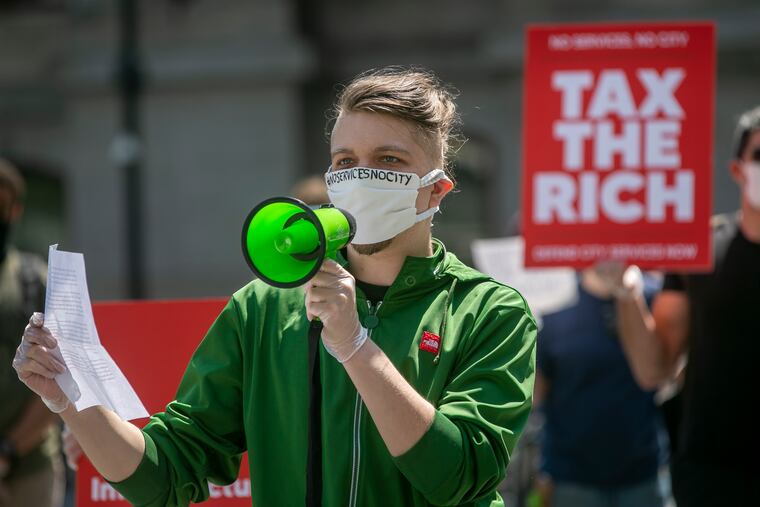City workers facing layoffs say Philadelphia should tax the rich. Is that possible?
Hundreds of workers stand to get laid off in Mayor Kenney's proposed budget. Some are calling for the city to, among other things, reinstitute a tax on the wealthy known as the "Personal Property Tax."

They clear vacant lots, run free after-school programs, and act as guardians for neighborhoods hard hit by the opioid crisis.
And now, many of them stand to lose their jobs as Mayor Jim Kenney is forced to cut costs after business shutdowns forced by the coronavirus pandemic left the city with a $649 million budget hole.
But a coalition of city workers — both union and nonunion — says there are ways the city can address its revenue shortfall and avoid layoffs. The workers have launched #NoServicesNoCity: Campaign for a Just Philly Budget, calling for Kenney and City Council to implement measures that will collect money from bigger businesses, major nonprofits, and wealthy individuals. Slashing city services, they say, will hurt Philadelphia’s poorest and most vulnerable during a time when people are already struggling with massive job losses and a public health crisis.
“The mayor needs to increase service, not cut it,” said Iliyaas Muhammad, who cleans and seals abandoned houses for the city’s Department of Licenses and Inspections. (His unit is not currently slated for cuts.)
» READ MORE: Tax hikes, layoffs, and no swimming pools: Mayor Jim Kenney’s coronavirus budget isn’t pretty
The workers held a demonstration Tuesday outside City Hall, coupled with a social media campaign and a petition calling on elected officials to explore solutions other than layoffs.
Elected officials — from Kenney to City Controller Rebecca Rhynhart to Councilmember Isaiah Thomas — have proposed plans to recoup revenue lost during the pandemic. Still, the #NoServicesNoCity campaign is noteworthy because it’s led by the workers, who are also Philadelphia residents who stand to be affected by service cuts.
“This will affect the city all the way around,” said Muhammad, 54, who lives in Overbrook. “Trash pickups, the parks, our libraries.”
The workers propose:
Doubling the gross receipts tax — a tax on goods and services sold in the city — as a way to tax bigger businesses in Philadelphia. Currently, the first $100,000 in sales is exempt from this tax, which advocates say would essentially shield small businesses from the tax increase.
Reinstituting the personal property tax, which taxes the value of stocks and bonds held by individuals and companies.
Ending the property tax abatement for bigger businesses.
Making some nonprofits — such as the big hospitals and universities — make payments in lieu of taxes, commonly referred to as PILOTs.
The proposals are, for the most part, feasible, though they would require some legal finesse, experts say. The bigger question is whether they are politically feasible.
They would have to be approved by the mayor and City Council. And the city’s business community would likely not be in favor.
» READ MORE: When you can’t march on City Hall, can you demand accountability? Advocates are finding out.
The city cannot legally levy a higher tax on bigger businesses than smaller businesses, said tax lawyer Stewart Weintraub. An increase in the gross receipts tax or an end to the property tax abatement would have to be applied across the board.
The Pennsylvania Supreme Court found the personal property tax, essentially a tax on the wealthy that Philadelphia ended in 1997, to be unconstitutional in 2000 because it exempted the value of stocks from local businesses. The city could, however, find a state statute that allowed it to impose this tax in a way that didn’t violate that decision, Weintraub said. Such a statute exists, he added.
The city could find a way to impose PILOTs on big nonprofits, but it would have to challenge their federal status as a charitable institution exempt from property taxes. Philadelphia has been called an “outlier" for not pursuing PILOTs by Adam Langley, who studies tax exemptions at the Lincoln Institute of Land Policy, a Massachusetts-based think tank.
Though Kenney had once said he believed the city should get nonprofits to pay PILOTs, his administration has not acted on it.
“Large universities and medical institutions are crucial to the city’s employment and long-term financial health,” said Kenney spokesperson Mike Dunn, citing the city’s “limited” ability to impose PILOTs on them.
Dunn also said that “multiple tax reform commissions have advised the city that increasing [the gross receipts tax] hurts the city’s competitiveness and negatively impacts the city’s long-term growth."
As part of his plan that includes laying off hundreds of city workers, Kenney has proposed raising the city’s property and parking taxes, as well as the wage tax for suburban commuters — a plan that has already drawn skepticism from some in City Council.
» HELP US REPORT: Are you a health care worker, medical provider, government worker, patient, frontline worker or other expert? We want to hear from you.
Rhynhart proposes cutting overtime and dipping into the city’s recession reserve. Thomas and Rhynhart both proposed dipping into the funds generated by Kenney’s sweetened-drink tax that pays for pre-K, community schools, and a program to improve parks and recreation centers.